Verdict
Cheap doesn’t have to mean tacky as the Majority Tru Bio show. The audio performance is clear and detailed, the secure fit is reliable and they’re simple to use. Those looking for an inexpensive noise-cancelling pair or one to use for calls should look elsewhere though.
Pros
- Secure, snug fit
- Inexpensive price
- Long battery life
- Balanced approach to audio
Cons
- Controls feel a bit stiff
- Below average call quality
- Fast charging is a bit slow
Introduction
Let’s be honest, cheap true wireless earphones are a dime a dozen, and they’re such an impulse buy that most people would purchase them without thinking twice.
But there are still times where the word cheap applies to products in the other sense, that of being inferior and tatty. Even if you’re spending a relatively inexpensive amount on a pair of headphones, you’d still want them to work as described.
So where does the Majority Tru Bio fall on the scale? If you’ve not heard of Majority before, then have a look at the reviews of the Sierra Plus and Snowdon II soundbars but suffice to say it is a company that deals in affordable products without scrimping (too much) on quality. We’ve enjoyed what we’ve heard so far from Majority, can that form extend to its true wireless models?
Design
- Snug, secure fit
- Physical buttons for operation
- Made from compostable plastic parts
Anyone who has recently shopped for a true wireless will know that there are two dominant forms in terms of design. There’s a version with a stem (the AirPods 3 being the most common), and the version that slots completely into the ear. As you can see, the Tru Bio are quite clearly the latter.
The shape is reminiscent of a tadpole, but they’re ergonomic and mould themselves into the ear for a snug, secure, and tight fit. I find there is that ‘plugged in’ feeling that might cause discomfort for some, but I prefer that, especially if there’s no noise-cancelling tech to accompany the buds. The passive noise isolating design is strong with these true wireless earbuds, as wearing them on the Jubilee and Victoria Underground lines in London reduced the noise of the carriage and the Tube going through tunnels by a huge amount.
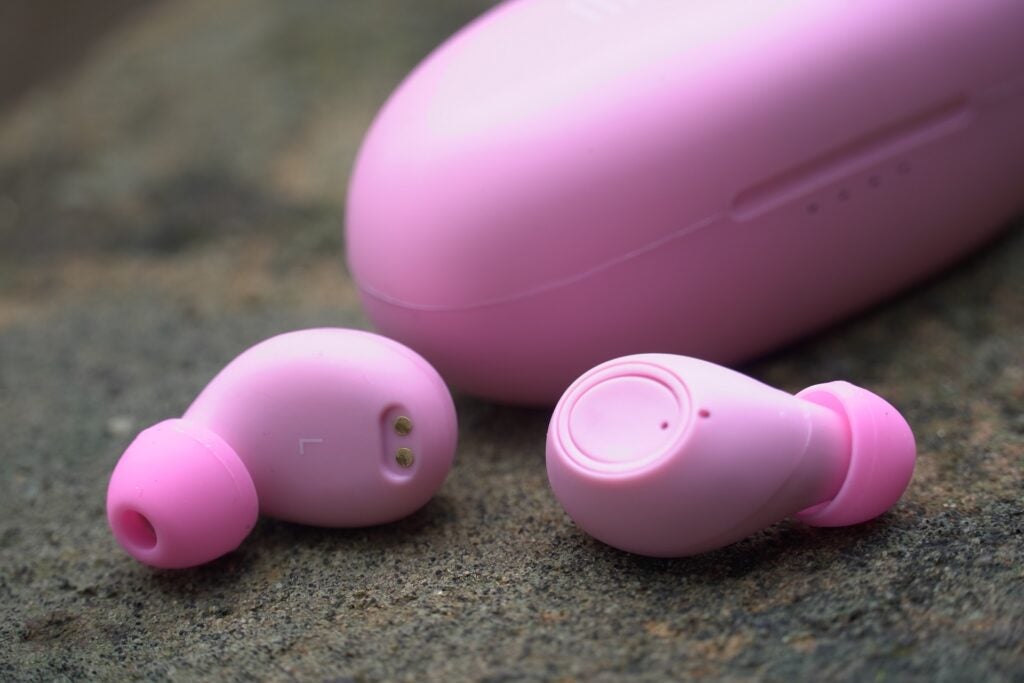
The build quality is pretty plastic, but there’s an interesting concept about the Tru Bio in that it’s made from 100% certified compostable plastic parts (buds, case, and the drivers). So if you are concerned about environmental waste or the materials used to create products, the Tru bio would appear to be at the positive end of the scale in terms of sustainability.
The use of compostable plastic parts also ensures that the earbuds are super-light at just 4.5g per bud. Hard plastic aside, I do find them comfortable to wear whether over short or longer periods of time. In the packaging are two further ear-tip sizes (small and large) to go with the default medium to help adjust that fit.
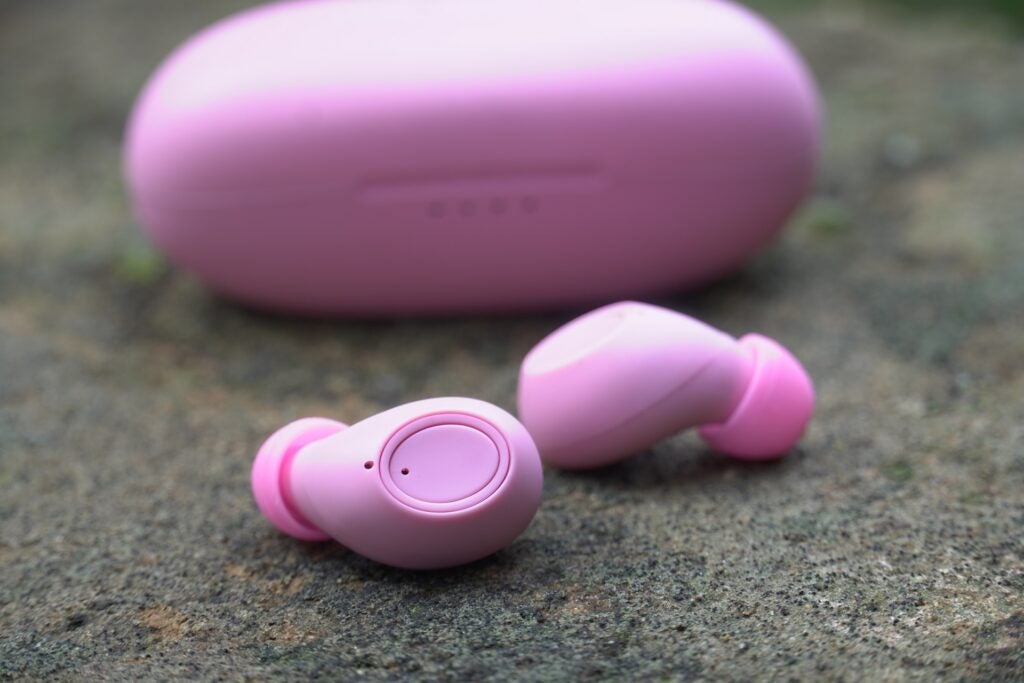
Operation is via physical buttons, which at this price point seems a sensible decision. The controls are, however, a bit stiff and unlike, say, the Jabra Elite 3, require more pressure to click down on them. Again, that can push the earbuds further into the ear, which is unlikely to be of comfort for those that don’t like that ‘plugged in’ sensation. There’s no mention of an IP rating on the website but according to Majority these buds have an IPX7 rating, so they are waterproof and could be easily used for the gym or even in wet weather.
The oval-shaped charging case shares the same predominantly plastic build quality, and it is slightly translucent too, as when the buds are put into the cradle, I can see them glow (briefly) through the surface, which is a neat visual touch. On the front is an LED indicator to show the current charge of the case, while on the rear is a USB-C port (a cable is provided). Colours include pink (this sample), white and blue.
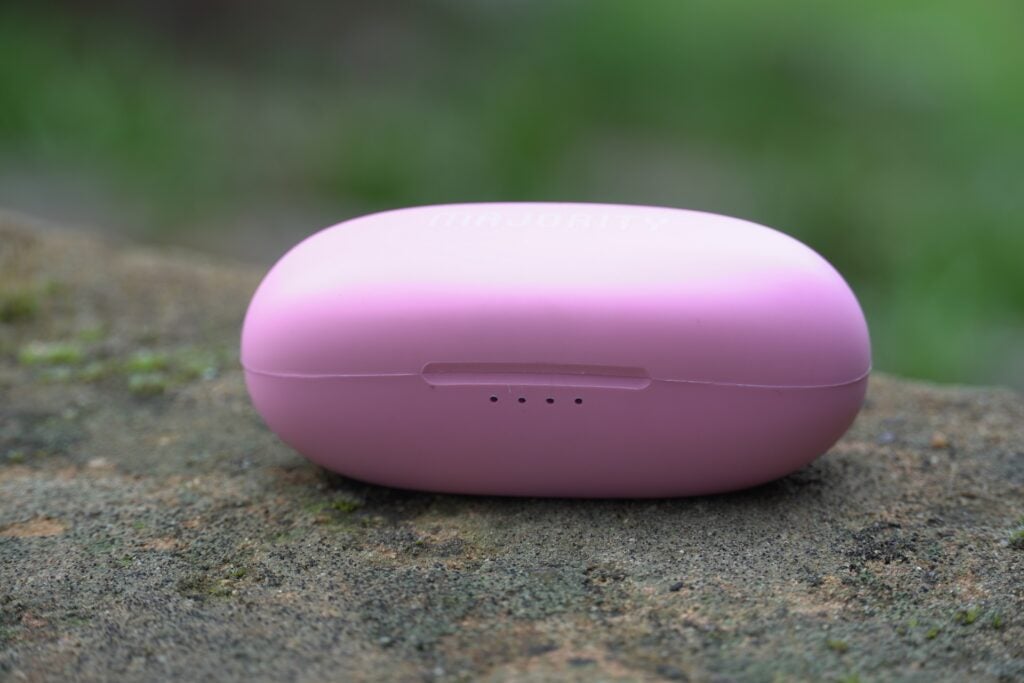
Features
- Long battery life
- Fast-charging is slow
- Below average call quality
The Majority Tru Bio aren’t the most advanced earbuds, but that doesn’t mean that what they offer isn’t up to snuff.
There’s no noise-cancelling, no transparency mode, no companion app and all the features that would come with one. This is a simple pair of earbuds, and likely aimed at a target audience that just requires a pair of buds to plonk in and start listening to music.
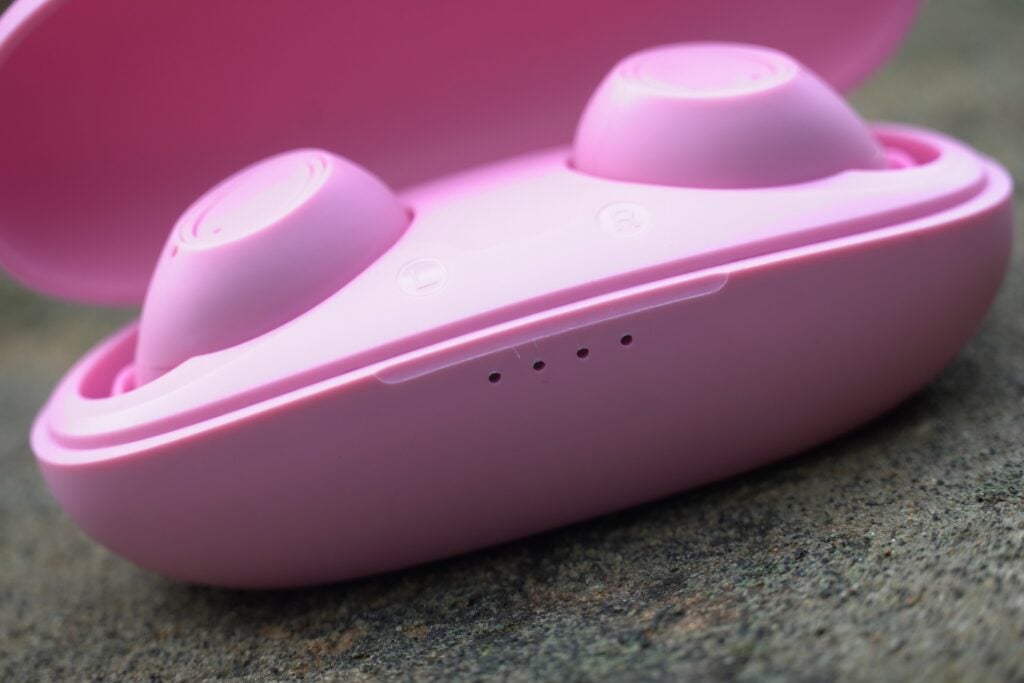
Majority’s battery claims are 30 hours in total, with 7.5 hours per bud (the case provides three extra charges). Performing a battery drain with a Spotify playlist at around 50% volume, the Tru Bio only dropped to 80% in about two hours. That suggests you could get more at around 10 hours, though higher volumes will likely bring that amount down to the Majority’s figures.
There’s no wireless charging, and given how slow it is, it’s still not the most efficient way of charging a device anyway. Fast charging is on the menu, although it’s not the fastest I’ve encountered. A half-hour of charging is reportedly enough for two more hours. That’s quite slow compared to, well, any other of the best wireless headphones we’ve reviewed.
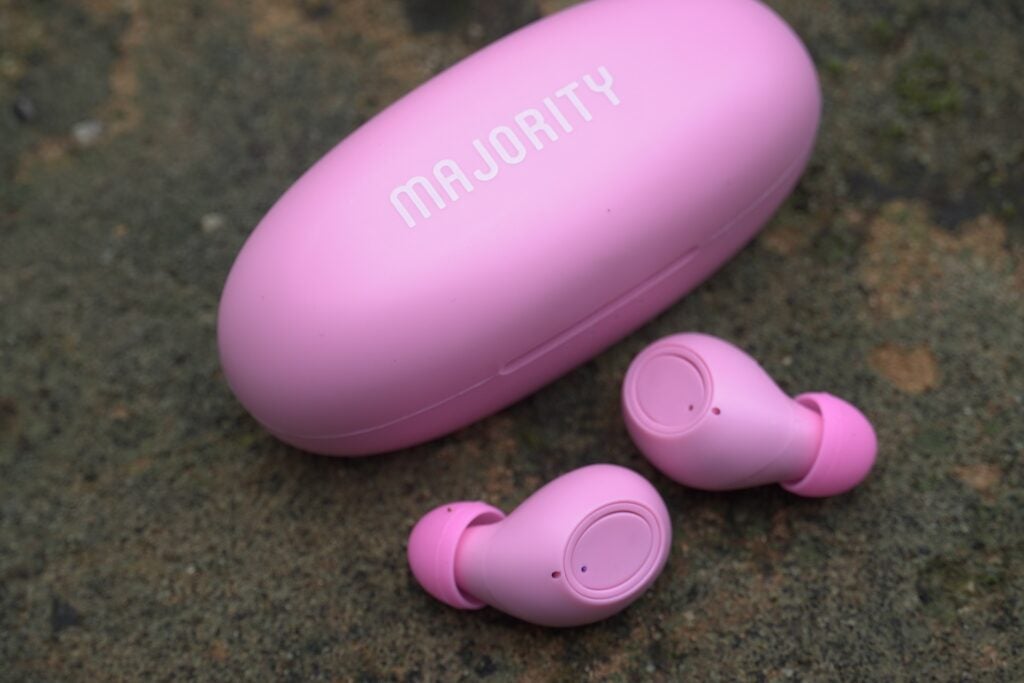
Bluetooth compatibility is the most recent 5.3 version but there’s no mention of Bluetooth multipoint whereby you can connect to two devices at the same time. Codec support equals SBC and AAC, which ensures these are a solid match for iOS and Android devices.
In terms of how strong the connection is with lots of interference, I found the Tru Bio never completely lost its connection to my smartphone but did phase in and out. By that, I mean hearing music in one earbud and then another but never at the same time. It seems deliberate and if it is, then it feels like a decent solution to listening to a very sporadic and jumpy connection.
There’s no mention of the tech used for calls, but whatever it is, the performance is below what I expect. It’s the usual case of being fine in quiet places but when it’s up against any noise it becomes a challenge. Traffic, food markets and even a group of schoolkids walking by meant the person on the other end couldn’t hear anything I was saying. I wouldn’t recommend using these buds anywhere approaching noisy.
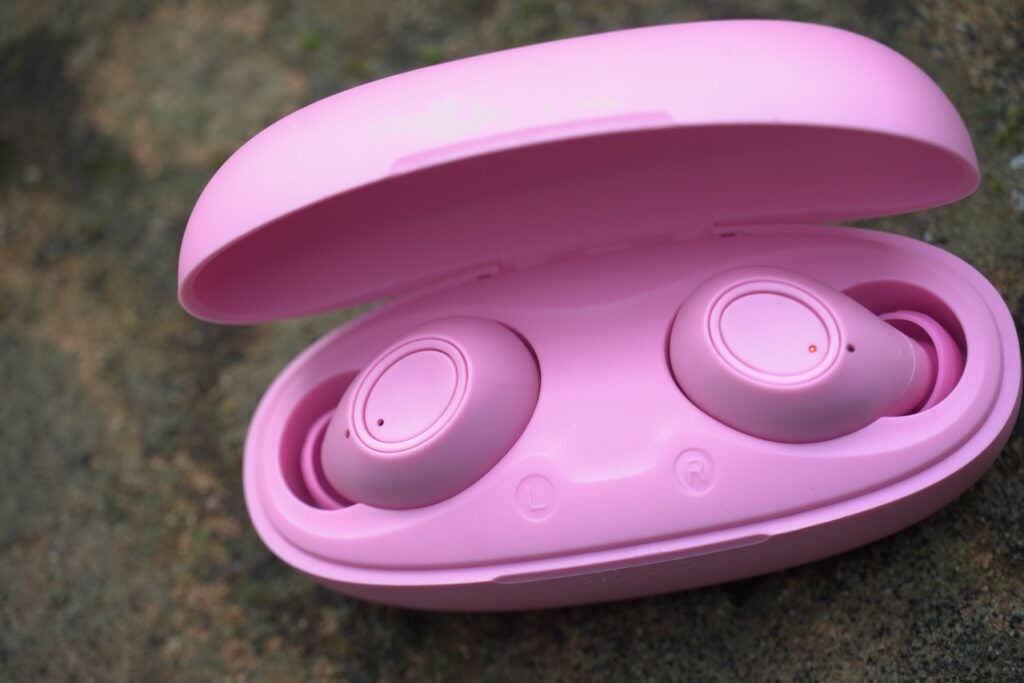
Sound Quality
- Punchy, confident bass
- Clear and detailed midrange
- Unremarkable treble performance
Majority describes the sound of the Tru Bio as crisp. Listening to them for several hours, I can understand what they’re aiming for, but I wouldn’t call them crisp in tone as that would imply a sharpness these buds don’t quite have. The Tru Bio is a bit firmer in delivery, as well as being clear and hovering around neutral in their approach to describing music.
The way the Majority handles the top end of the frequency range is the most qualified aspect of its performance. There’s a dulled, rolled off aspect to treble that doesn’t really bring out much brightness in the piano notes of the GogGo Penguin’s Erased by Sunlight; nor does it give as much shine to Shuggie Otis’ Strawberry Letter 23.
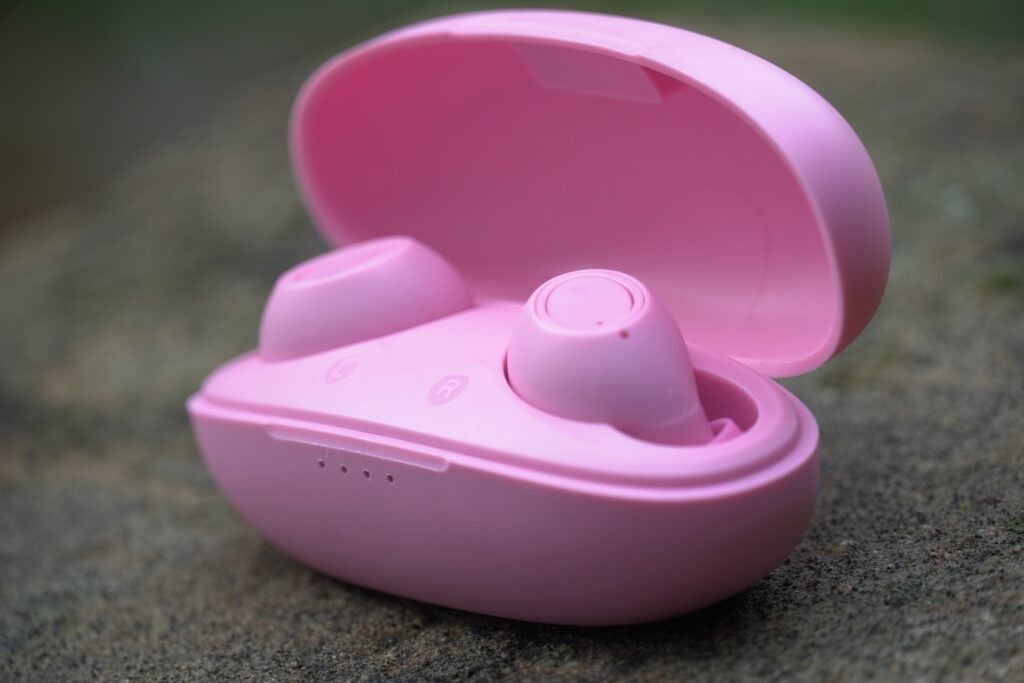
That’s not to say that the top end is described in a fuzzy, unclear manner – there are good amounts of clarity that the Tru Bio brings to the table, but it does very much sound as if it’s on the safe side in how it handles those higher frequencies. Another example is the cymbal crashes in Audioslave’s Wide Awake, which aren’t afforded the crispness to tease out the detail of those hits.
The rest of the frequency range is handled with more assurance. Vocals are firmly described but natural in tone too. Chris Cornell’s voice in Wide Awake is unmistakably his, as are the delicate falsetto vocals of Ed Tullet in Irredeemer or Lauryn Hill’s soulful tones in Nas’ If I Ruled the World. The Tru Bio gets vocal performances just right without adding or colouring them.
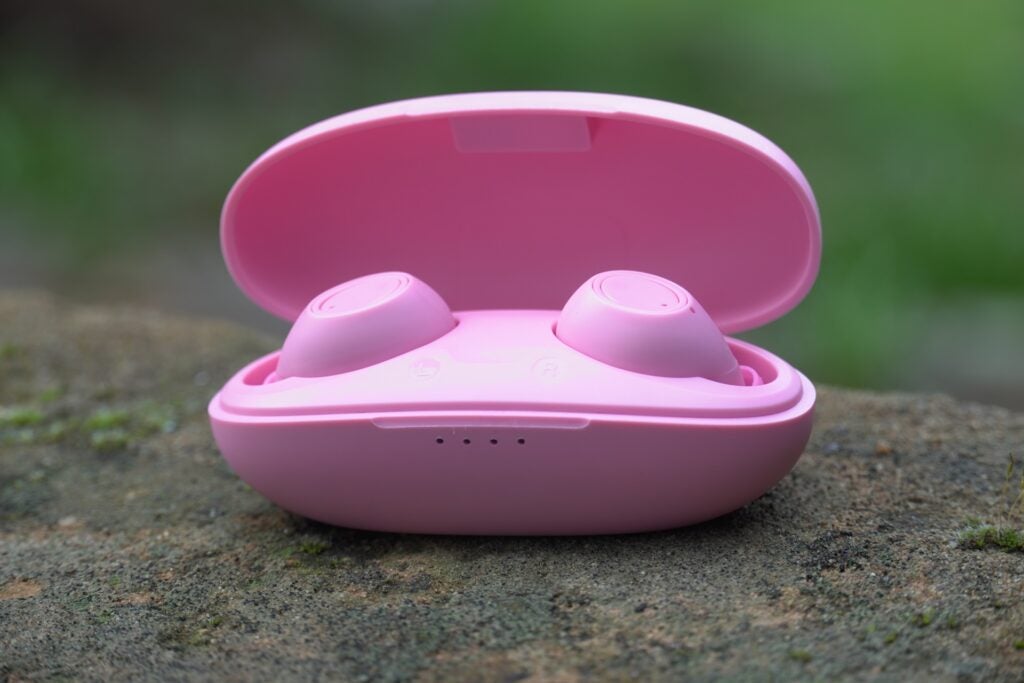
Its sense of clarity and detail is better than the Earfun Air Pro 3, with instruments better defined and clearer too, avoiding that smooth richness that the Earfun goes for. Low frequencies are punchy, assertive, and bring plenty of weight to tracks like Basement Jaxx’s Where’s You Head At or Busta Rhyme’s Put Your Hands Where My Eyes Could See. There’s a nice balance that the Majority Tru Bio achieves here – bass might be a little boosted, but it steers clear of overwhelming the midrange.
I could argue for my dynamism, the Majority are pretty consistent in terms of how they deal with dynamic shifts from quiet to loud and vice versa (which is to say not much) but there’s solid energy and rhythmic skill in capturing the flow of Doves’ Black And White Town, though again a little more dynamism would give the track more of an impact.
Latest deals
Should you buy it?
Good sound at an inexpensive price: The Majority’s firm but clear and detailed delivery avoids the excesses of similarly price buds like the Ugreen HiTune T3. This is a solid-sounding pair of buds.
You’re after noise-cancellation: There’s no support for noise-cancelling, and if that’s what you’re after then Majority does offer the Tru 2 ANC model, plus there’s the rival HiTune T3 that sells at a similar price.
Final Thoughts
The Majority Tru Bio are a solid pair of true wireless earbuds with a clear and detailed audio performance, effective design, and long battery life. They keep things simple and do most of what they set out to do well – for that they should be commended.
The Bluetooth connection can get shaky in busy areas, and their call quality is disappointing even for a true wireless. They don’t support noise-cancellation, so you’d be better off looking at the Earfun Air Pro 3 if that’s a key feature desired.
Otherwise, in the Tru Bio you’ve got a solid-sounding performer at an inexpensive price. They’re certainly worth further enquiries for those after a cheap true wireless pair.
How we test
We test every pair of headphones we review thoroughly over an extended period of time. We use industry-standard tests to compare features properly. We’ll always tell you what we find. We never, ever, accept money to review a product.
Find out more about how we test in our ethics policy.
FAQs
There’s no noise-cancellation available with this model, but Majority does offer the Tru 2 ANC that supports that technology and is available for a similar price.
Sustainability
Trusted Reviews’ holds the fact that global warming is not a myth as a core value and will continuously endeavour to help protect our planet from harm in its business practices.
As part of this mission, whenever we review a product we send the company a series of questions to help us gauge and make transparent the impact the device has on the environment.
We currently haven’t received answers to the questions on this product, but will update this page the moment we do. You can see a detailed breakdown of the questions we ask and why in our sustainability page.
Jargon buster
Midrange
Midrange refers to the part of the frequency range that sits between the bass and treble. The midrange is the area that handles vocals and most of the instruments heard in a track. It can also be in reference to midrange loudspeaker drivers that replicate this area of the frequency range.
Bluetooth
Bluetooth – named after 10th-century Danish king Harald Bluetooth who united Denmark’s tribes into a single kingdom – is a method of wireless transmission that allows for the exchange of data between devices over short distances.
Verdict
Cheap doesn’t have to mean tacky as the Majority Tru Bio show. The audio performance is clear and detailed, the secure fit is reliable and they’re simple to use. Those looking for an inexpensive noise-cancelling pair or one to use for calls should look elsewhere though.
Pros
- Secure, snug fit
- Inexpensive price
- Long battery life
- Balanced approach to audio
Cons
- Controls feel a bit stiff
- Below average call quality
- Fast charging is a bit slow
Introduction
Let’s be honest, cheap true wireless earphones are a dime a dozen, and they’re such an impulse buy that most people would purchase them without thinking twice.
But there are still times where the word cheap applies to products in the other sense, that of being inferior and tatty. Even if you’re spending a relatively inexpensive amount on a pair of headphones, you’d still want them to work as described.
So where does the Majority Tru Bio fall on the scale? If you’ve not heard of Majority before, then have a look at the reviews of the Sierra Plus and Snowdon II soundbars but suffice to say it is a company that deals in affordable products without scrimping (too much) on quality. We’ve enjoyed what we’ve heard so far from Majority, can that form extend to its true wireless models?
Design
- Snug, secure fit
- Physical buttons for operation
- Made from compostable plastic parts
Anyone who has recently shopped for a true wireless will know that there are two dominant forms in terms of design. There’s a version with a stem (the AirPods 3 being the most common), and the version that slots completely into the ear. As you can see, the Tru Bio are quite clearly the latter.
The shape is reminiscent of a tadpole, but they’re ergonomic and mould themselves into the ear for a snug, secure, and tight fit. I find there is that ‘plugged in’ feeling that might cause discomfort for some, but I prefer that, especially if there’s no noise-cancelling tech to accompany the buds. The passive noise isolating design is strong with these true wireless earbuds, as wearing them on the Jubilee and Victoria Underground lines in London reduced the noise of the carriage and the Tube going through tunnels by a huge amount.

The build quality is pretty plastic, but there’s an interesting concept about the Tru Bio in that it’s made from 100% certified compostable plastic parts (buds, case, and the drivers). So if you are concerned about environmental waste or the materials used to create products, the Tru bio would appear to be at the positive end of the scale in terms of sustainability.
The use of compostable plastic parts also ensures that the earbuds are super-light at just 4.5g per bud. Hard plastic aside, I do find them comfortable to wear whether over short or longer periods of time. In the packaging are two further ear-tip sizes (small and large) to go with the default medium to help adjust that fit.

Operation is via physical buttons, which at this price point seems a sensible decision. The controls are, however, a bit stiff and unlike, say, the Jabra Elite 3, require more pressure to click down on them. Again, that can push the earbuds further into the ear, which is unlikely to be of comfort for those that don’t like that ‘plugged in’ sensation. There’s no mention of an IP rating on the website but according to Majority these buds have an IPX7 rating, so they are waterproof and could be easily used for the gym or even in wet weather.
The oval-shaped charging case shares the same predominantly plastic build quality, and it is slightly translucent too, as when the buds are put into the cradle, I can see them glow (briefly) through the surface, which is a neat visual touch. On the front is an LED indicator to show the current charge of the case, while on the rear is a USB-C port (a cable is provided). Colours include pink (this sample), white and blue.

Features
- Long battery life
- Fast-charging is slow
- Below average call quality
The Majority Tru Bio aren’t the most advanced earbuds, but that doesn’t mean that what they offer isn’t up to snuff.
There’s no noise-cancelling, no transparency mode, no companion app and all the features that would come with one. This is a simple pair of earbuds, and likely aimed at a target audience that just requires a pair of buds to plonk in and start listening to music.

Majority’s battery claims are 30 hours in total, with 7.5 hours per bud (the case provides three extra charges). Performing a battery drain with a Spotify playlist at around 50% volume, the Tru Bio only dropped to 80% in about two hours. That suggests you could get more at around 10 hours, though higher volumes will likely bring that amount down to the Majority’s figures.
There’s no wireless charging, and given how slow it is, it’s still not the most efficient way of charging a device anyway. Fast charging is on the menu, although it’s not the fastest I’ve encountered. A half-hour of charging is reportedly enough for two more hours. That’s quite slow compared to, well, any other of the best wireless headphones we’ve reviewed.

Bluetooth compatibility is the most recent 5.3 version but there’s no mention of Bluetooth multipoint whereby you can connect to two devices at the same time. Codec support equals SBC and AAC, which ensures these are a solid match for iOS and Android devices.
In terms of how strong the connection is with lots of interference, I found the Tru Bio never completely lost its connection to my smartphone but did phase in and out. By that, I mean hearing music in one earbud and then another but never at the same time. It seems deliberate and if it is, then it feels like a decent solution to listening to a very sporadic and jumpy connection.
There’s no mention of the tech used for calls, but whatever it is, the performance is below what I expect. It’s the usual case of being fine in quiet places but when it’s up against any noise it becomes a challenge. Traffic, food markets and even a group of schoolkids walking by meant the person on the other end couldn’t hear anything I was saying. I wouldn’t recommend using these buds anywhere approaching noisy.

Sound Quality
- Punchy, confident bass
- Clear and detailed midrange
- Unremarkable treble performance
Majority describes the sound of the Tru Bio as crisp. Listening to them for several hours, I can understand what they’re aiming for, but I wouldn’t call them crisp in tone as that would imply a sharpness these buds don’t quite have. The Tru Bio is a bit firmer in delivery, as well as being clear and hovering around neutral in their approach to describing music.
The way the Majority handles the top end of the frequency range is the most qualified aspect of its performance. There’s a dulled, rolled off aspect to treble that doesn’t really bring out much brightness in the piano notes of the GogGo Penguin’s Erased by Sunlight; nor does it give as much shine to Shuggie Otis’ Strawberry Letter 23.

That’s not to say that the top end is described in a fuzzy, unclear manner – there are good amounts of clarity that the Tru Bio brings to the table, but it does very much sound as if it’s on the safe side in how it handles those higher frequencies. Another example is the cymbal crashes in Audioslave’s Wide Awake, which aren’t afforded the crispness to tease out the detail of those hits.
The rest of the frequency range is handled with more assurance. Vocals are firmly described but natural in tone too. Chris Cornell’s voice in Wide Awake is unmistakably his, as are the delicate falsetto vocals of Ed Tullet in Irredeemer or Lauryn Hill’s soulful tones in Nas’ If I Ruled the World. The Tru Bio gets vocal performances just right without adding or colouring them.

Its sense of clarity and detail is better than the Earfun Air Pro 3, with instruments better defined and clearer too, avoiding that smooth richness that the Earfun goes for. Low frequencies are punchy, assertive, and bring plenty of weight to tracks like Basement Jaxx’s Where’s You Head At or Busta Rhyme’s Put Your Hands Where My Eyes Could See. There’s a nice balance that the Majority Tru Bio achieves here – bass might be a little boosted, but it steers clear of overwhelming the midrange.
I could argue for my dynamism, the Majority are pretty consistent in terms of how they deal with dynamic shifts from quiet to loud and vice versa (which is to say not much) but there’s solid energy and rhythmic skill in capturing the flow of Doves’ Black And White Town, though again a little more dynamism would give the track more of an impact.
Latest deals
Should you buy it?
Good sound at an inexpensive price: The Majority’s firm but clear and detailed delivery avoids the excesses of similarly price buds like the Ugreen HiTune T3. This is a solid-sounding pair of buds.
You’re after noise-cancellation: There’s no support for noise-cancelling, and if that’s what you’re after then Majority does offer the Tru 2 ANC model, plus there’s the rival HiTune T3 that sells at a similar price.
Final Thoughts
The Majority Tru Bio are a solid pair of true wireless earbuds with a clear and detailed audio performance, effective design, and long battery life. They keep things simple and do most of what they set out to do well – for that they should be commended.
The Bluetooth connection can get shaky in busy areas, and their call quality is disappointing even for a true wireless. They don’t support noise-cancellation, so you’d be better off looking at the Earfun Air Pro 3 if that’s a key feature desired.
Otherwise, in the Tru Bio you’ve got a solid-sounding performer at an inexpensive price. They’re certainly worth further enquiries for those after a cheap true wireless pair.
How we test
We test every pair of headphones we review thoroughly over an extended period of time. We use industry-standard tests to compare features properly. We’ll always tell you what we find. We never, ever, accept money to review a product.
Find out more about how we test in our ethics policy.
FAQs
There’s no noise-cancellation available with this model, but Majority does offer the Tru 2 ANC that supports that technology and is available for a similar price.
Sustainability
Trusted Reviews’ holds the fact that global warming is not a myth as a core value and will continuously endeavour to help protect our planet from harm in its business practices.
As part of this mission, whenever we review a product we send the company a series of questions to help us gauge and make transparent the impact the device has on the environment.
We currently haven’t received answers to the questions on this product, but will update this page the moment we do. You can see a detailed breakdown of the questions we ask and why in our sustainability page.
Jargon buster
Midrange
Midrange refers to the part of the frequency range that sits between the bass and treble. The midrange is the area that handles vocals and most of the instruments heard in a track. It can also be in reference to midrange loudspeaker drivers that replicate this area of the frequency range.
Bluetooth
Bluetooth – named after 10th-century Danish king Harald Bluetooth who united Denmark’s tribes into a single kingdom – is a method of wireless transmission that allows for the exchange of data between devices over short distances.

























